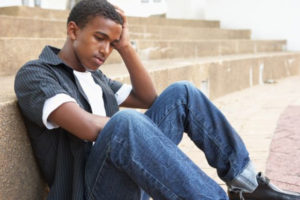
“Sixty years after Brown vs. Board of Education, racism remains a toxic stressor commonly experienced by youth of color,” said lead author Dr. Lee M. Pachter. “The fact that these experiences are encountered during adolescence — a critically sensitive period for identity development — is of great concern, as is our finding of slightly higher rates of depression, anxiety and social phobias in those youth who have more experiences with discrimination.”
The researchers analyzed data from the National Survey of American Life, which examines racial, ethnic and cultural influences on the mental health of African-Americans and Afro-Caribbean people (Black residents of the United States who are of Caribbean descent). Interviews were conducted with a nationally representative sample of 1,170 adolescents (1,017 African-Americans and 137 of Afro-Caribbean descent) ages 13-17 years.
“Our study looked at the relationships between perceived racial discrimination (racism) and various mental health issues. We wanted to see if African-American and Afro-Caribbean teenagers who experienced racial discrimination have higher rates of depression, anxiety or social phobia,” said Pachter, professor of pediatrics at Drexel University College of Medicine and chief of general pediatrics at St. Christopher’s Hospital for Children in Philadelphia.
This is one of the few studies to look at experiences of Black youth of Caribbean ancestry and ethnicity separately from African-American youth, Dr. Pachter noted. Because of differences in culture, pre- and post-immigration experiences, and other factors, it is important to differentiate groups that generally are lumped together as “Black” in the same way that Latinos are separated into subgroups such as Mexican American, Puerto Rican, Cuban, etc.
Survey results showed that 85 percent of the adolescents experienced racial discrimination during their lifetime, 6 percent experienced major depression, 17 percent suffered from anxiety and 13 percent had social phobias. In the year before they were surveyed, 4 percent of teens had major depression, and 14 percent experienced anxiety.
Experiences with discrimination were associated with a higher likelihood of major depression, anxiety disorder and social phobia, as well as major depression and anxiety in the 12 months before the survey was conducted. These associations were present for both African-Americans and Afro-Caribbean participants, for males and females, and for younger and older teens.
Results also showed that increasing levels of racial discrimination had a greater impact on Afro-Caribbean youth, who experienced higher rates of anxiety than African-American teens.
“The challenge now is to identify interventions at the individual, family and community levels to lessen the mental health effects of racial discrimination while we as a society grapple with ways to eliminate it as a toxic stressor,” Pachter concluded.
Source: eurekalert.org


